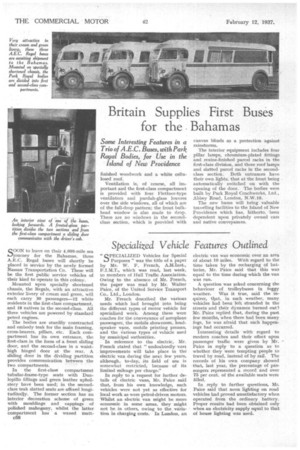Specialized Vehicle Features Outlined
Page 108

If you've noticed an error in this article please click here to report it so we can fix it.
QPECIALIZED Vehicles for Special Purposes " was the title of a paper by Mr. W. F. French, A.M.Inst., F.I.M.T., which was read, last week, to members of Hull Traffic Association. Owing to the absence of Mr. French, the paper was read by Mr. Walter Paice, of the United Service Transport Co., Ltd., London.
Mr. French described the various needs which had brought into being the different types of motor vehicle for specialized work. Among these were coaches for the conveyance of aeroplane passengers, the mobile showroom, loudspeaker vans, mobile printing presses, and the various types of vehicle used by municipal authorities.
In reference to the electric, Mr. French stated that " undoubtedly vast improvements will take place in the electric van during the next few years, although, to-day, its field of use is somewhat restricted, because of its limited mileage per charge."
In reply to a request for further details of electric vans, Mr. Paice said that, from his own knowledge, such vehicles were not yet as effective for local work as were petrol-driven motors. Whilst an electric van might be more economic in some areas, they might not be in others, owing to the variation in charging costs. In London, an electric van was economic over an area of about 10 miles. With regard to the time taken by the recharging of batteries, Mr. Paice said that this was equal to the time during which the van was run.
A question was asked concerning the behaviour of troIleybuses in foggy weather. Was it true, said the inquirer, that, in such weather, many vehicles had been left stranded in the streets and their dynamos burned out? Mr. Paice replied that, during the past few months, when there had been many fogs, he was afraid that such happenings had occurred.
Interesting details with regard to modern coaches and their effect upon passenger traffic were given by Mr. Palen in reply to a question as to whether they were tempting people to travel by road, instead of by rail. The records of his own company showed that, last year, the percentage of passengers represented a record and over 75 per cent. of the available seats were In reply to farther questions, Mr. Paice said that neon lighting on road vehicles had proved unsatisfactory when operated from the ordinary battery. Proper results had been obtained only when an electricity supply equal to that of house lighting was used.




























































































































































